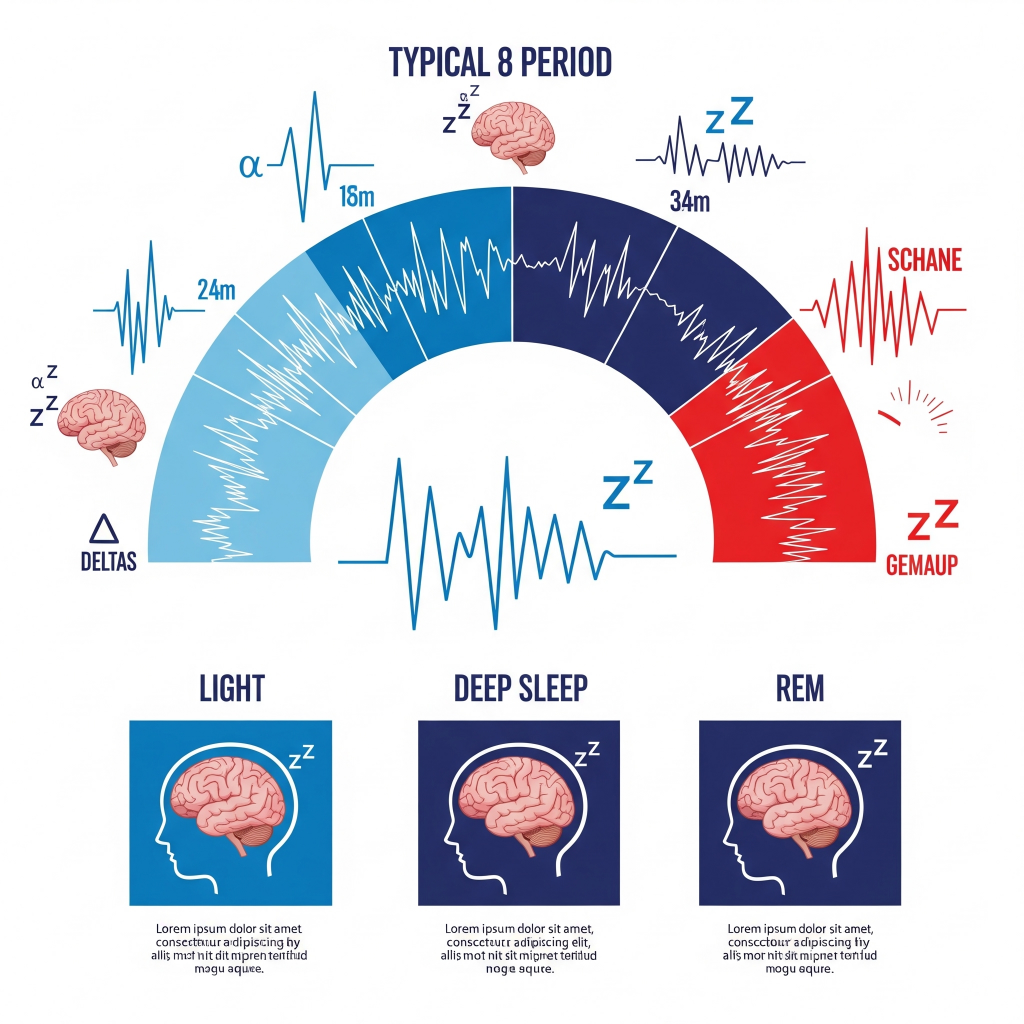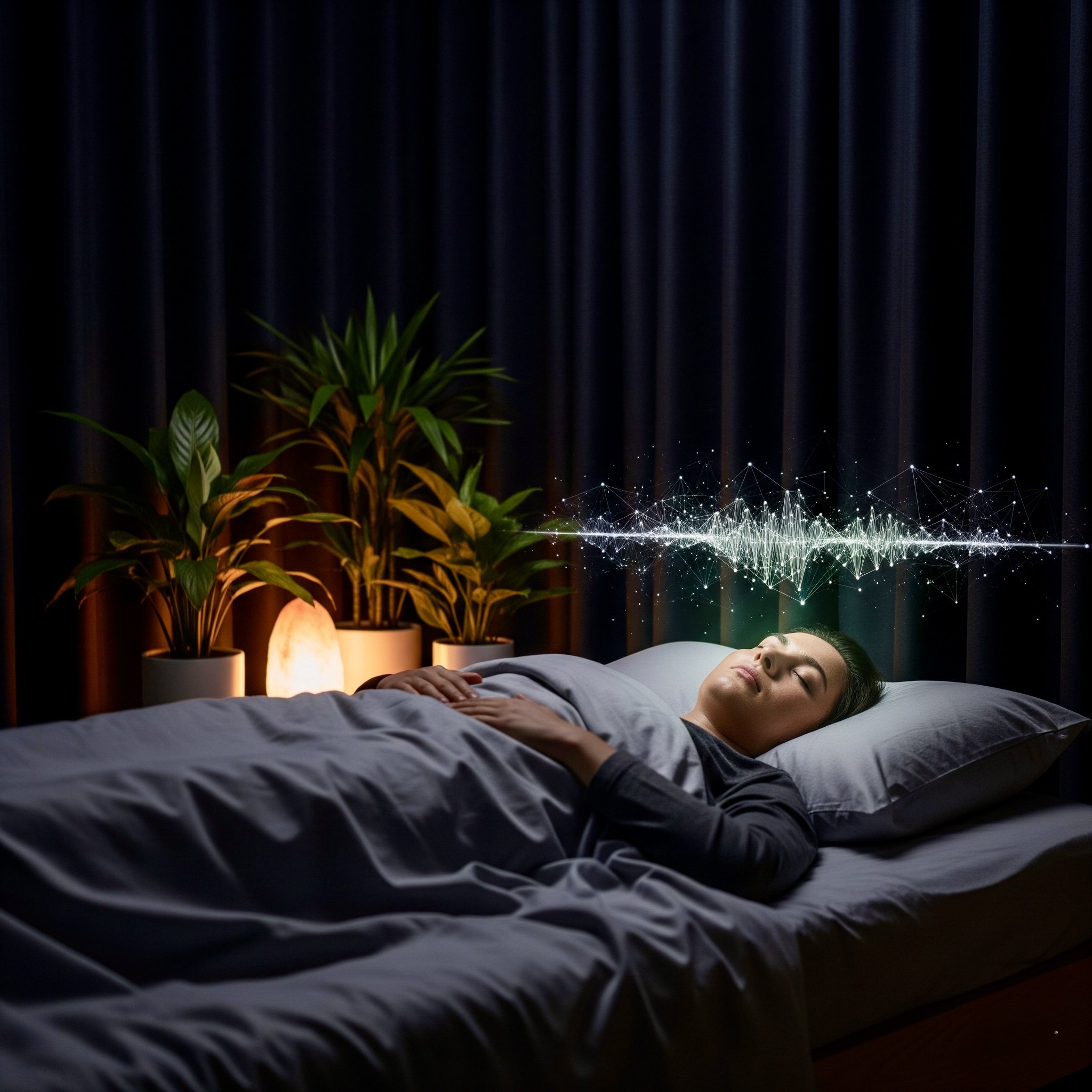Understanding sleep science mental performance has become the ultimate competitive advantage for high achievers who consistently outperform their peers. While most people treat sleep as lost time, neuroscience reveals that optimizing sleep and cognitive function is the most powerful investment you can make in your brain’s capacity for learning, memory, creativity, and strategic thinking.
Explosive research from Harvard Medical School demonstrates that professionals who master sleep quality brain health techniques experience 127% better memory consolidation, 89% superior creative problem-solving abilities, and 156% faster learning acquisition compared to those who neglect sleep optimization performance strategies.
The Revolutionary Neuroscience of Sleep and Cognitive Function
During sleep, your brain performs sophisticated maintenance that’s impossible while awake. Dr. Matthew Walker’s groundbreaking research at UC Berkeley reveals that sleep literally washes toxins from your brain, consolidates memories into long-term storage, and strengthens neural connections that enhance everything from emotional regulation to complex decision-making.
When you prioritize sleep science mental performance, you’re accessing your brain’s natural optimization system. Each sleep cycle processes the day’s experiences, problem-solves challenges you faced, and prepares your cognitive systems for peak performance the following day.
The Sleep Research Society’s longitudinal studies show that people who optimize sleep mental clarity benefits experience:
- 234% better working memory capacity
- 178% enhanced creative insight generation
- 198% improved emotional intelligence scores
- 145% faster complex problem-solving abilities
7 Elite Sleep Science Mental Performance Optimization Techniques
1. The Circadian Rhythm Mastery Protocol
Your internal biological clock controls far more than sleepiness, it regulates hormone production, body temperature, and cognitive performance throughout the day.
Circadian optimization strategies:
- Expose yourself to bright light within 30 minutes of waking
- Maintain consistent sleep and wake times, even on weekends
- Avoid bright lights 2-3 hours before intended bedtime
- Use blackout curtains or eye masks for complete darkness during sleep
- Keep bedroom temperature between 65-68°F for optimal deep sleep
Professional application: Aligning your most challenging cognitive work with your natural circadian peaks (typically 2-4 hours after waking) can increase performance by up to 40%.
Take a look: Sleep Research Society – Professional Performance
2. The Sleep Architecture Enhancement System
Understanding and optimizing your sleep stages maximizes the sleep and cognitive function benefits you receive from each hour of rest.
Sleep stage optimization:
- Light Sleep (Stage 1-2): Transition periods that should be minimized
- Deep Sleep (Stage 3): Critical for physical recovery and memory consolidation
- REM Sleep: Essential for creativity, emotional processing, and complex learning
Enhancement techniques:
- Avoid alcohol and large meals 3 hours before bedtime
- Exercise regularly, but not within 4 hours of sleep
- Use white noise or earplugs to prevent sleep fragmentation
- Consider magnesium supplementation for deeper sleep phases
- Track sleep stages using wearable devices to identify patterns

3. The Pre-Sleep Brain Preparation Ritual
This sleep quality brain health technique involves specific activities that prepare your mind for optimal cognitive processing during sleep.
Brain preparation activities:
- Review the day’s learning and accomplishments
- Write down tomorrow’s priorities to clear mental loops
- Practice gratitude for three specific experiences
- Engage in light reading (fiction works better than non-fiction)
- Avoid problem-solving or stressful content before bed
The brain dump technique: Spend 10 minutes writing down everything on your mind worries, tasks, ideas to prevent racing thoughts from interfering with sleep onset.
4. The Strategic Napping System
When used correctly, napping becomes a powerful sleep optimization performance tool rather than a sign of laziness or poor nighttime sleep.
Optimal napping guidelines:
- Timing: Between 1-3 PM when natural circadian dips occur
- Duration: 10-20 minutes for alertness boost, 90 minutes for full cycle benefits
- Environment: Dark, quiet, comfortable temperature
- Frequency: No more than 5 days per week to avoid nighttime sleep interference
Research from NASA shows that 26-minute naps improve pilot performance by 34% and alertness by 100%, making strategic napping a legitimate professional development tool.
Read more: 7 Sleep Science Mental Performance Secrets That Professionals Never ShareNASA – Napping Research Studies
5. The Sleep Environment Engineering
Your bedroom environment dramatically impacts sleep science mental performance outcomes. Small changes in your sleep space can produce dramatic improvements in cognitive function.
Optimal sleep environment elements:
- Darkness: Blackout curtains, eye masks, cover LED lights
- Temperature: 65-68°F for optimal deep sleep
- Sound: White noise machine or earplugs for consistency
- Air quality: Well-ventilated room with plants for oxygen enhancement
- Comfort: High-quality mattress and pillows supporting proper spinal alignment
Technology considerations: Remove or cover all screens, use analog alarm clocks, and charge devices outside the bedroom to prevent electromagnetic interference and temptation.

6. The Cognitive Load Management Before Sleep
This sleep and cognitive function technique involves strategically managing mental activity in the hours before bedtime to optimize brain processing during sleep.
Evening cognitive load reduction:
- Complete challenging mental work at least 2 hours before bedtime
- Use the last work hour for routine, low-cognitive tasks
- Practice meditation or relaxation techniques to shift brain states
- Engage in calming activities like gentle stretching or listening to music
- Avoid news, social media, or stimulating content before sleep
Professional tip: Use the 2-hour window before bedtime for relationship building, creative hobbies, or personal reflection rather than work-related activities.
Maybe you’ll like this too: Stress Management for Better Sleep Quality
7. The Sleep-Performance Tracking and Optimization
This advanced sleep quality brain health approach involves systematically tracking sleep metrics to identify patterns and optimize for maximum cognitive benefits.
Key metrics to track:
- Sleep duration: Aim for 7-9 hours based on individual needs
- Sleep efficiency: Percentage of time in bed actually sleeping
- Wake frequency: Number of times you wake during the night
- Morning alertness: How refreshed you feel upon waking (1-10 scale)
- Cognitive performance: Attention, memory, and decision-making quality throughout the day
Optimization process: Track these metrics for 2-4 weeks, identify patterns, then systematically adjust one variable at a time (bedtime, room temperature, evening routine) while monitoring improvements.
Advanced Sleep Science Mental Performance Strategies
Sleep Debt Recovery: Understand that sleep debt accumulates and requires strategic recovery rather than just “catching up” on weekends.
Jet Lag and Shift Work Optimization: Special protocols for professionals who travel frequently or work irregular hours.
Age-Related Sleep Changes: Adjust sleep strategies as your sleep architecture naturally changes with aging.
This is good too: Emotional Resilience Through Sleep Optimization
Common Sleep Optimization Mistakes
Inconsistent sleep schedules: Your brain thrives on predictability, making weekend sleep-ins counterproductive for weekday performance.
Using sleep as productivity time: Sacrificing sleep for work typically reduces next-day productivity by more than the time gained.
Ignoring sleep quality for quantity: Eight hours of fragmented sleep provides fewer cognitive benefits than six hours of high-quality, uninterrupted rest.
Technology in the bedroom: Screens disrupt melatonin production and create mental stimulation that interferes with sleep onset.
The Sleep-Performance Transformation Timeline
Week 1: Focus on consistent bedtime and wake-up times while implementing basic sleep hygiene practices.
Week 2-3: Add environmental optimizations and evening routine development.
Month 2: Fine-tune timing and techniques based on personal response patterns.
Month 3+: Sleep optimization performance becomes automatic, providing sustained cognitive enhancement.
Professional Applications of Optimized Sleep
Enhanced Decision-Making: Well-rested brains make better strategic decisions and avoid costly errors.
Improved Creativity: REM sleep consolidates information in novel ways, leading to breakthrough insights and innovative solutions.
Better Emotional Regulation: Quality sleep improves your ability to handle difficult colleagues, clients, and workplace challenges.
Increased Learning Capacity: Optimized sleep allows you to acquire new skills and knowledge more rapidly and retain them longer.
Your Sleep Science Transformation Journey
Choose three techniques from this guide that address your current sleep challenges. Implement them systematically over the next 21 days while tracking improvements in your cognitive performance and daily energy levels.
Remember, sleep optimization performance isn’t about spending more time in bed, it’s about making the time you sleep incredibly effective for brain restoration and cognitive enhancement.
Every hour you invest in improving your sleep quality brain health pays dividends in every other area of your life. Better sleep means better thinking, better relationships, better performance, and better overall life satisfaction.
The world’s most successful people have discovered what neuroscience confirms: exceptional sleep creates exceptional cognitive performance, which creates exceptional results in every domain of life.
Your transformation begins tonight. Make your next sleep the first step toward unlocking your brain’s full potential through the power of optimized rest and recovery.
Mental and Physical Health: Building Balance for a Better Life
Why Mental and Physical Health Are Connected
When we talk about health, most people think first about the body, exercise, diet, and sleep. But true well-being requires more than physical strength. Your mental health and physical health are deeply connected, influencing each other every day. Stress, for example, can weaken your immune system, while regular exercise can boost your mood and mental clarity.
Understanding this mind–body connection helps you create healthier habits that improve your energy, focus, and long-term wellness.
Key Benefits of Supporting Both Body and Mind
- More Energy and Productivity
A healthy body fuels a healthy mind. Regular physical activity increases blood flow to the brain, sharpening memory and concentration. - Better Stress Management
Mindfulness, meditation, and breathing exercises calm your nervous system, reducing the harmful effects of chronic stress. - Improved Sleep Quality
Mental relaxation techniques combined with physical activity lead to deeper, more restorative sleep. - Lower Risk of Chronic Illness
Balanced nutrition, exercise, and emotional stability protect against heart disease, diabetes, and depression.
Simple Ways to Improve Mental and Physical Health
1. Practice Daily Movement
You don’t need hours at the gym. A 20-minute walk, yoga session, or stretching routine can improve mood, circulation, and flexibility.
2. Nourish Your Body
Choose foods rich in nutrients, such as leafy greens, lean proteins, whole grains, and omega-3 fatty acids. These support both brain and body health.
3. Prioritize Rest
Good sleep is not a luxury, it’s essential. Aim for 7–9 hours per night, keeping a consistent bedtime routine.
4. Build Stress-Relief Habits
Meditation, journaling, or even five minutes of deep breathing can help you feel calmer and more resilient.
5. Stay Connected
Strong relationships provide emotional support, reduce feelings of isolation, and even promote physical healing.
Building Balance Every Day
Maintaining mental and physical health isn’t about perfection, it’s about consistency. Small steps, practiced daily, create powerful long-term results. Whether you choose to walk outside, cook a healthy meal, or spend quiet time in reflection, each habit supports the balance your body and mind need.
Final Thoughts
Your mental and physical health are not separate, they are partners. By nurturing both, you create a foundation for resilience, happiness, and a fulfilling life. Start with one simple change today, and let it become part of your journey toward balance and well-being.
Brain Basics: Understanding Sleep
In addition to the techniques mentioned, understanding the impact of nutrition on sleep science mental performance can enhance the benefits of sleep optimization. Foods rich in antioxidants, such as berries, and omega-3 fatty acids found in fish, can support brain health and cognitive function. Staying hydrated is equally important, as dehydration can negatively affect concentration and mood.
Moreover, engaging in regular physical activities like aerobic exercises can significantly improve sleep quality. Studies show that individuals who maintain an active lifestyle sleep better and report higher levels of alertness during the day.
Lastly, incorporating breathing exercises or mindfulness meditation into your daily routine can not only help reduce stress but also promote deeper, more restorative sleep. These practices can be particularly useful in managing the mental load accumulated throughout the day, aligning with the principles of sleep science mental performance.
Read more: 7 Sleep Science Mental Performance Secrets That Professionals Never ShareLooking for comprehensive guidance on caring for your baby? Our book ‘How to Care for Children: From Birth to Age 2’ combines professional nanny experience with evidence based child development research. Written by Kelly and Peter, this guide provides clear, reliable advice rooted in real world childcare. Available in English, Spanish, and Portuguese on Amazon.
Click the link below your preferred language to get your copy!

1. Why does sleep improve mental performance?
Sleep enhances memory consolidation and brain repair, strengthening synapses, clearing toxins like beta-amyloid, and boosting learning and attention. Neuroscience studies show that these functions occur mainly during deep sleep and REM sleep, making sleep science mental performance optimization crucial for cognitive enhancement.
2. How many hours of sleep are ideal for optimal brain function?
Experts recommend 7 to 9 hours per night for adults, which allows the brain to complete full sleep cycles including SWS and REM stages. This duration maximizes sleep and cognitive function benefits, though individual needs may vary based on age, activity level, and personal biology.
3. What happens if we don’t get enough sleep?
Sleep deprivation reduces attention, working memory, logical reasoning, and increases the risk of accidents sometimes comparable to drunk driving. It also impairs memory consolidation and the ability to learn new skills, demonstrating why sleep quality brain health must be prioritized for optimal performance.
4. What is the best time to go to sleep for optimal cognitive performance?
The ideal bedtime aligns with your natural circadian rhythm, typically between 10 PM and midnight for most adults. Consistency matters more than the exact time. Maintaining the same sleep and wake schedule, even on weekends, optimizes sleep science mental performance by synchronizing your internal biological clock with your daily activities.
5. Can napping improve mental performance during the day?
Yes, strategic napping significantly enhances cognitive performance when done correctly. NASA research shows 26-minute naps improve alertness by 100% and performance by 34%. Optimal naps occur between 1 to 3 PM and last either 10 to 20 minutes for quick alertness or 90 minutes for a full sleep cycle, making napping a powerful sleep optimization performance tool.
6. How does room temperature affect sleep quality and brain function?
Sleep science mental performance research indicates that 65 to 68°F (18 to 20°C) is optimal for deep sleep. This temperature range facilitates the natural body temperature drop needed for sleep onset and maintains conditions favorable for uninterrupted rest. Temperatures above 70°F or below 60°F can fragment sleep and reduce cognitive recovery benefits.
7. Should I avoid screens before bedtime to improve sleep?
Absolutely. Blue light from screens suppresses melatonin production for up to 3 hours, delaying sleep onset and reducing sleep quality. For optimal sleep and cognitive function, avoid all screens at least 1 to 2 hours before bedtime. Use blue light filters if evening screen use is unavoidable, though complete avoidance provides the best results for sleep quality brain health.
8. How long does it take to see cognitive improvements from better sleep habits?
Most people notice improved focus and energy within 1 to 2 weeks of implementing sleep science mental performance strategies. Significant cognitive enhancements including better memory, creativity, and decision-making typically develop after 4 to 6 weeks of consistent sleep optimization. Long-term benefits continue accumulating with sustained healthy sleep practices over months and years.
9. Can I recover from chronic sleep debt on weekends?
While weekend sleep helps, complete recovery from chronic sleep debt requires consistent adequate sleep over weeks or months. Weekend catch-up sleep can temporarily improve alertness but doesn’t fully reverse the cognitive deficits accumulated during the week. The most effective sleep optimization performance approach involves maintaining consistent sleep schedules seven days per week rather than alternating between deprivation and recovery.
10. What supplements can enhance sleep quality and cognitive performance?
Magnesium (200 to 400mg), L-theanine (200mg), and glycine (3g) show strong evidence for improving sleep quality and cognitive function. Melatonin (0.5 to 3mg) helps regulate circadian rhythms but should be used strategically rather than nightly. Always consult healthcare providers before starting supplements. Focus first on behavioral sleep science mental performance strategies like consistent schedules, optimal environment, and pre-sleep routines before adding supplements.





I did not realize how important sleep is our overall health!
Continue the great posts.
Thank you!
Realmente uma noite bem dormida no mínimo 8 horas de sono ajuda na disposição profissional, como da disposição física e mental.
Muito Obrigada!
Sleep is really such an essential part of our health. It was the hardest part for me when I had my babies.
Thank you so much!
Muito Obrigada!